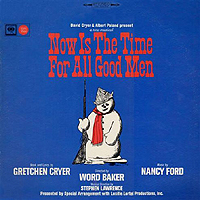 Original Off-Broadway Cast, 1968 (Columbia/DRG)
Original Off-Broadway Cast, 1968 (Columbia/DRG)  (4 / 5) With a book and lyrics by Gretchen Cryer and music by Nancy Ford, Now Is the Time for All Good Men is set in a small town in the Midwest. Its central character is Mike Butler, a new teacher whose liberal views have a strong effect on the townspeople. In its attempt to be hard-hitting, contemporary, and relevant, the show was helped by a solid score written in a theatricalized late-’60s pop style. Heading the first-rate cast, David Cryer — then married to Gretchen — is splendid as Mike in two haunting solos, “What’s in the Air?” and “All Alone.” His leading lady is Gretchen Cryer, performing under the name Sally Niven. But there’s no vanity casting here; she’s perfect as Sarah, a shy schoolteacher who’s swept up in the events that Mike’s liberalism sets in motion. Sarah’s growing affection for Mike is showcased in “He Could Show Me,” a fine ballad, and Mrs. Cryer’s light soprano mixes well with her husband’s solid baritenor in the charming duets “Tea in the Rain” and “Rain Your Love on Me.” Better still is “My Holiday,” a poignant twin-soliloquies song about Christmas season loneliness; it’s a gem that deserves to be a holiday standard. Other standouts: David Sabin offers a sweet rendition of “A Simple Life,” Judy Frank sings a raucous, country-rock-flavored “Stuck Up,” and Steven Skiles and Anne Kaye are impressive in “Down Through History.” — Jeffrey Dunn
(4 / 5) With a book and lyrics by Gretchen Cryer and music by Nancy Ford, Now Is the Time for All Good Men is set in a small town in the Midwest. Its central character is Mike Butler, a new teacher whose liberal views have a strong effect on the townspeople. In its attempt to be hard-hitting, contemporary, and relevant, the show was helped by a solid score written in a theatricalized late-’60s pop style. Heading the first-rate cast, David Cryer — then married to Gretchen — is splendid as Mike in two haunting solos, “What’s in the Air?” and “All Alone.” His leading lady is Gretchen Cryer, performing under the name Sally Niven. But there’s no vanity casting here; she’s perfect as Sarah, a shy schoolteacher who’s swept up in the events that Mike’s liberalism sets in motion. Sarah’s growing affection for Mike is showcased in “He Could Show Me,” a fine ballad, and Mrs. Cryer’s light soprano mixes well with her husband’s solid baritenor in the charming duets “Tea in the Rain” and “Rain Your Love on Me.” Better still is “My Holiday,” a poignant twin-soliloquies song about Christmas season loneliness; it’s a gem that deserves to be a holiday standard. Other standouts: David Sabin offers a sweet rendition of “A Simple Life,” Judy Frank sings a raucous, country-rock-flavored “Stuck Up,” and Steven Skiles and Anne Kaye are impressive in “Down Through History.” — Jeffrey Dunn
All posts by Michael Portantiere
No Way to Treat a Lady
 Off-Broadway Cast, 1997 (Varèse Sarabande)
Off-Broadway Cast, 1997 (Varèse Sarabande)  (4 / 5) Douglas J. Cohen’s chamber musical No Way to Treat a Lady received the American Academy of Arts and Letters’ Richard Rodgers Award and two productions (in 1987 and 1996) by Off-Broadway nonprofits, but it never snagged a commercial New York staging. Fortunately, the musical component of the first-rate 1996 York Theatre production was lovingly preserved on this recording, produced by Bruce Kimmel. The show is an adaptation of a novel by William Goldman about two mamas’ boys: a warm-hearted detective and an erudite serial killer. Despite being adversaries, the two share a yen for the big-time public recognition that their ambitious mothers always wished for them. The well-nigh perfect cast consists of Adam Grupper as the tough detective, Marguerite MacIntyre as the ingenue, Paul Schoeffier as the sinister thrill killer — and the astonishingly good Alix Korey, who plays the cop’s overbearing mother, three murder victims, and the ghost of the murderer’s mom. The musicality of the singers and the six-person combo, conducted by Wendy Bobbitt, is unimpeachable. But the recording’s star is composer-lyricist Cohen, who has an impressive vocabulary that includes jazz, pop, and even funk. The songs and the libretto (also by Cohen) are thoroughly integrated, with stretches of virtuosic material: Korey’s snoopy “I Hear Humming,” for instance, and Grupper’s horny “The First Move.” There are also several examples of wonderful melodic invention, such as “I Need a Life,” “Safer in My Arms,” and “So Far, So Good.” — Charles Wright
(4 / 5) Douglas J. Cohen’s chamber musical No Way to Treat a Lady received the American Academy of Arts and Letters’ Richard Rodgers Award and two productions (in 1987 and 1996) by Off-Broadway nonprofits, but it never snagged a commercial New York staging. Fortunately, the musical component of the first-rate 1996 York Theatre production was lovingly preserved on this recording, produced by Bruce Kimmel. The show is an adaptation of a novel by William Goldman about two mamas’ boys: a warm-hearted detective and an erudite serial killer. Despite being adversaries, the two share a yen for the big-time public recognition that their ambitious mothers always wished for them. The well-nigh perfect cast consists of Adam Grupper as the tough detective, Marguerite MacIntyre as the ingenue, Paul Schoeffier as the sinister thrill killer — and the astonishingly good Alix Korey, who plays the cop’s overbearing mother, three murder victims, and the ghost of the murderer’s mom. The musicality of the singers and the six-person combo, conducted by Wendy Bobbitt, is unimpeachable. But the recording’s star is composer-lyricist Cohen, who has an impressive vocabulary that includes jazz, pop, and even funk. The songs and the libretto (also by Cohen) are thoroughly integrated, with stretches of virtuosic material: Korey’s snoopy “I Hear Humming,” for instance, and Grupper’s horny “The First Move.” There are also several examples of wonderful melodic invention, such as “I Need a Life,” “Safer in My Arms,” and “So Far, So Good.” — Charles Wright
No Strings
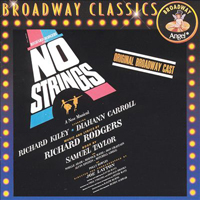 Original Broadway Cast, 1962 (Capitol/DRG/Broadway Angel)
Original Broadway Cast, 1962 (Capitol/DRG/Broadway Angel)  (3 / 5) Does this sound like a Richard Rodgers musical? A black American fashion model, living in Paris with a rich older lover in attendance, falls in love with a washed-up American novelist who spends his time mooching off of rich patrons. Their romance is played out against an international background of poseurs, party-goers, and professional guests. Not only does the couple not stay together, librettist Samuel Taylor does not make it clear what will happen to them at the end of the show. And that’s No Strings. Composer Rodgers, flying solo after the death of Oscar Hammerstein, furnished his own lyrics and found a style all his own. Richard Kiley and Diahann Carroll are the romantic pair, and though both are fine, she’s the real star here — sassy in “Loads of Love,” furious in “You Don’t Tell Me,” eloquently angry at herself in “An Orthodox Fool.” Her voice blends beautifully with Kiley’s in ballads like “Nobody Told Me,” the title song, and “The Sweetest Sounds,” which features one of Rodgers’ most unusual melodies. These are interspersed with such astringent items as “Be My Host,” “Love Makes the World Go,” and “Eager Beaver,” most of them featuring Bernice Massi as an American heiress who gets taken for a ride by Kiley’s fast-living friends. Ralph Burns’ orchestrations are true to the title; in Joe Layton’s staging, the wind and brass musicians freely roamed the stage with the actors, giving the score an improvisational, jazzy quality. No Strings is not considered a major Rodgers work, but this is one of the master composer’s most distinctive scores, and it’s historically significant for his work as a lyricist. — David Barbour
(3 / 5) Does this sound like a Richard Rodgers musical? A black American fashion model, living in Paris with a rich older lover in attendance, falls in love with a washed-up American novelist who spends his time mooching off of rich patrons. Their romance is played out against an international background of poseurs, party-goers, and professional guests. Not only does the couple not stay together, librettist Samuel Taylor does not make it clear what will happen to them at the end of the show. And that’s No Strings. Composer Rodgers, flying solo after the death of Oscar Hammerstein, furnished his own lyrics and found a style all his own. Richard Kiley and Diahann Carroll are the romantic pair, and though both are fine, she’s the real star here — sassy in “Loads of Love,” furious in “You Don’t Tell Me,” eloquently angry at herself in “An Orthodox Fool.” Her voice blends beautifully with Kiley’s in ballads like “Nobody Told Me,” the title song, and “The Sweetest Sounds,” which features one of Rodgers’ most unusual melodies. These are interspersed with such astringent items as “Be My Host,” “Love Makes the World Go,” and “Eager Beaver,” most of them featuring Bernice Massi as an American heiress who gets taken for a ride by Kiley’s fast-living friends. Ralph Burns’ orchestrations are true to the title; in Joe Layton’s staging, the wind and brass musicians freely roamed the stage with the actors, giving the score an improvisational, jazzy quality. No Strings is not considered a major Rodgers work, but this is one of the master composer’s most distinctive scores, and it’s historically significant for his work as a lyricist. — David Barbour
No, No, Nanette
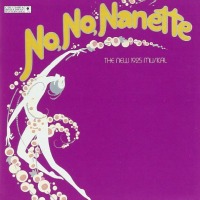 Broadway Cast, 1971 (Columbia/Sony)
Broadway Cast, 1971 (Columbia/Sony)  (5 / 5) Pure heaven. This revisal of a nearly forgotten 1925 hit helped kick off the nostalgia craze on Broadway. Burt Shevelove did a good job of adapting Otto Harbach and Frank Mandel’s book, a typical farcical tangle of the period, but the Vincent Youmans-Irving Caesar songs are everything here. And Ralph Burns’ gloriously expansive orchestrations, complete with two pianos, are among the finest ever for a Broadway musical. The entire cast embraces both the silliness and sophistication of the material, and the leads are sublime. Helen Gallagher delivers the eccenttic “Too Many Rings Around Rosie” and the scorching “‘Where-Has-My-Hubby-Gone’ Blues.” Jack Gilford and Susan Watson are charming in “I Want to Be Happy,” Bobby Van partners with Gallagher in the amusingly hyperactive “You Can Dance With Any Girl at All,” and Watson and Roger Rathburn offer a fresh rendition of “Tea for Two.” On the original LP release of this recording, Ruby Keeler was only heard singing a bit of “Take a Little One Step” and delivering a few lines of dialogue in the “Finaletto Act II,” but one of the bonus tracks on the CD is “Only a Moment Ago,” a Keeler-Gilford duet that was cut from the show before it opened. The CD also includes quite a bit of material that was dropped from the LP edition due to space, including the Act II opener, “Peach on the Beach.” This cast album, more than most, preserves the electric excitement of a Broadway performance. It’s essential to any collection. — David Barbour
(5 / 5) Pure heaven. This revisal of a nearly forgotten 1925 hit helped kick off the nostalgia craze on Broadway. Burt Shevelove did a good job of adapting Otto Harbach and Frank Mandel’s book, a typical farcical tangle of the period, but the Vincent Youmans-Irving Caesar songs are everything here. And Ralph Burns’ gloriously expansive orchestrations, complete with two pianos, are among the finest ever for a Broadway musical. The entire cast embraces both the silliness and sophistication of the material, and the leads are sublime. Helen Gallagher delivers the eccenttic “Too Many Rings Around Rosie” and the scorching “‘Where-Has-My-Hubby-Gone’ Blues.” Jack Gilford and Susan Watson are charming in “I Want to Be Happy,” Bobby Van partners with Gallagher in the amusingly hyperactive “You Can Dance With Any Girl at All,” and Watson and Roger Rathburn offer a fresh rendition of “Tea for Two.” On the original LP release of this recording, Ruby Keeler was only heard singing a bit of “Take a Little One Step” and delivering a few lines of dialogue in the “Finaletto Act II,” but one of the bonus tracks on the CD is “Only a Moment Ago,” a Keeler-Gilford duet that was cut from the show before it opened. The CD also includes quite a bit of material that was dropped from the LP edition due to space, including the Act II opener, “Peach on the Beach.” This cast album, more than most, preserves the electric excitement of a Broadway performance. It’s essential to any collection. — David Barbour
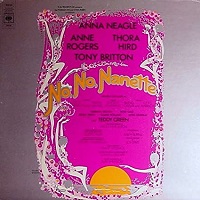 London Cast, 1973 (CBS)
London Cast, 1973 (CBS)  (4 / 5) One of the best London cast albums of an American musical ever released, this recording is commendable first of all for excellent sound quality that does full justice to the fabulous original orchestrations and vocal arrangements respectively crafted by Ralph Burns and Buster Davis for this smash hit revisal, in a performance that’s very well conducted by Grant Hossack. Some key changes notwithstanding, the score is presented here pretty much exactly as it was on the Broadway cast album. Aside from Peter Gale, who brings a rather thin voice with a lamb’s-bleat vibrato to the role of Tom, the performances aurally preserved here are very satisfying: Anne Rogers is vivacious as Lucille, Teddy Green energetic and appealing as Billy, Tony Britton charming as Jimmy. If Barbara Brown can’t match Susan Watson’s gorgeous soprano in Nanette’s songs, she has a lovely, fresh sound that’s perhaps more credible for a very young woman on the cusp of maturity, and it’s a joy to hear the veteran British musical star Anna Neagle as Sue in “Take a Little One Step” and an added vocal bit in “I Want to Be Happy.” The cast’s British accents somehow don’t seem especially incongruous in this material, even if you may sometimes think you’re listening to a recording of The Boy Friend. Fun bit of trivia: In the title song, a reference to a city in New Jersey has been changed from Trenton to Hackensack — presumably because the latter sounds funnier, especially to Brit audiences. — Michael Portantiere
(4 / 5) One of the best London cast albums of an American musical ever released, this recording is commendable first of all for excellent sound quality that does full justice to the fabulous original orchestrations and vocal arrangements respectively crafted by Ralph Burns and Buster Davis for this smash hit revisal, in a performance that’s very well conducted by Grant Hossack. Some key changes notwithstanding, the score is presented here pretty much exactly as it was on the Broadway cast album. Aside from Peter Gale, who brings a rather thin voice with a lamb’s-bleat vibrato to the role of Tom, the performances aurally preserved here are very satisfying: Anne Rogers is vivacious as Lucille, Teddy Green energetic and appealing as Billy, Tony Britton charming as Jimmy. If Barbara Brown can’t match Susan Watson’s gorgeous soprano in Nanette’s songs, she has a lovely, fresh sound that’s perhaps more credible for a very young woman on the cusp of maturity, and it’s a joy to hear the veteran British musical star Anna Neagle as Sue in “Take a Little One Step” and an added vocal bit in “I Want to Be Happy.” The cast’s British accents somehow don’t seem especially incongruous in this material, even if you may sometimes think you’re listening to a recording of The Boy Friend. Fun bit of trivia: In the title song, a reference to a city in New Jersey has been changed from Trenton to Hackensack — presumably because the latter sounds funnier, especially to Brit audiences. — Michael Portantiere
No For An Answer
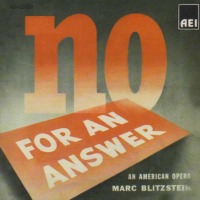 Original Cast, 1941 (Pearl/AEI)
Original Cast, 1941 (Pearl/AEI)  (3 / 5) Marc Blitzstein’s follow-up to The Cradle Will Rock failed to coalesce and ran for only three performances — yet it earned a cast recording, with Blitzstein at the piano. Billed as a “new American opera” but closer to a pro-union revue with a few plot threads, No for an Answer is innovative in form and passionate about the plight of the disenfranchised. Some of the songs sound decades ahead of their time in their unusual construction; consider “Francie,” a hummed melody with spoken interjections but virtually no lyrics. The score is not easy listening, and Blitzstein’s agitprop concert production employed few real singers, but the social anger and commitment to reform come through. The writer’s satirical gifts are fully apparent as well: “Penny Candy,” “Dimples,” and “Fraught” are sneaky parodies of the pop pablum of the day. It’s a mostly no-name cast (future movie director Martin Ritt is in the chorus), but one soon-to-be famous performer stands out. That would be Carol Channing, then an undergraduate at Bennington. In her two numbers, she sounds like nothing you’ve ever heard — she doesn’t even sound like Carol Channing — but her comic style is already assured and assuredly bizarre. — Marc Miller
(3 / 5) Marc Blitzstein’s follow-up to The Cradle Will Rock failed to coalesce and ran for only three performances — yet it earned a cast recording, with Blitzstein at the piano. Billed as a “new American opera” but closer to a pro-union revue with a few plot threads, No for an Answer is innovative in form and passionate about the plight of the disenfranchised. Some of the songs sound decades ahead of their time in their unusual construction; consider “Francie,” a hummed melody with spoken interjections but virtually no lyrics. The score is not easy listening, and Blitzstein’s agitprop concert production employed few real singers, but the social anger and commitment to reform come through. The writer’s satirical gifts are fully apparent as well: “Penny Candy,” “Dimples,” and “Fraught” are sneaky parodies of the pop pablum of the day. It’s a mostly no-name cast (future movie director Martin Ritt is in the chorus), but one soon-to-be famous performer stands out. That would be Carol Channing, then an undergraduate at Bennington. In her two numbers, she sounds like nothing you’ve ever heard — she doesn’t even sound like Carol Channing — but her comic style is already assured and assuredly bizarre. — Marc Miller
Nite Club Confidential
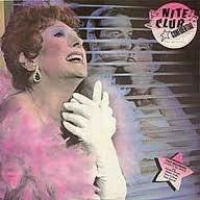 Original Off-Broadway Cast, 1983 (Confidential Recording Company/no CD)
Original Off-Broadway Cast, 1983 (Confidential Recording Company/no CD)  (1 / 5) This is a camp-fest, to say the least: a book musical with the feel of a revue, set in the demimonde of sophisticated 1950s cabarets and with a score made up of standards, semi-standards, and some new material. The plot concerns a young singer/stud who uses an aging chanteuse to advance his career, but the show revels so fully in its luridness that it doesn’t bother to offer any real wit or insight. Most of the few new songs by Albert Evans and Dennis Deal are fruity ’50s pastiche, though there’s a swell item called “The Canarsie Diner,” belted by Denise Nolin. The Evans-Deal arrangements of some good old songs (“That Old Black Magic,” “I Thought About You,” “Something’s Gotta Give”) are in authentic Hi-Los style, and the album does boast a glorious performance by Fay DeWitt, sounding much as she did in Flahooley more than 30 years earlier. Playing a Kay Thompson-like chanteuse, DeWitt avidly and sassily spoofs cabaret grande-dame conventions. When she sings a “Man That Got Away” knockoff called “The Long Goodbye,” her vowels practically fly off the LP and into the wall. Her dead-on inflections are hilarious. — Marc Miller
(1 / 5) This is a camp-fest, to say the least: a book musical with the feel of a revue, set in the demimonde of sophisticated 1950s cabarets and with a score made up of standards, semi-standards, and some new material. The plot concerns a young singer/stud who uses an aging chanteuse to advance his career, but the show revels so fully in its luridness that it doesn’t bother to offer any real wit or insight. Most of the few new songs by Albert Evans and Dennis Deal are fruity ’50s pastiche, though there’s a swell item called “The Canarsie Diner,” belted by Denise Nolin. The Evans-Deal arrangements of some good old songs (“That Old Black Magic,” “I Thought About You,” “Something’s Gotta Give”) are in authentic Hi-Los style, and the album does boast a glorious performance by Fay DeWitt, sounding much as she did in Flahooley more than 30 years earlier. Playing a Kay Thompson-like chanteuse, DeWitt avidly and sassily spoofs cabaret grande-dame conventions. When she sings a “Man That Got Away” knockoff called “The Long Goodbye,” her vowels practically fly off the LP and into the wall. Her dead-on inflections are hilarious. — Marc Miller
Nine
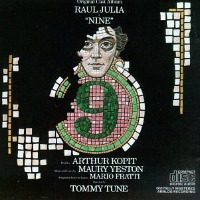 Original Broadway Cast, 1982 (Columbia/Sony)
Original Broadway Cast, 1982 (Columbia/Sony)  (5 / 5) The most original musical of its decade is both a dazzling exercise in style and a heartfelt tale of a middle-aged man’s fear of maturity. Arthur Kopit’s book for Nine is based on the Fellini film masterpiece 8½, about a famous director who holes up in a chic spa to retreat from his chaotic private life while he struggles to come up with an idea for his next project. The show is a wild, dreamlike, Felliniesque carnival in which Guido Contini — creatively stalled, his marriage collapsing — is besieged by all of the women from his past and present. Presiding over this fantasia is Raul Julia, a suave and saturnine presence throughout. He’s witty in “Guido’s Song,” seductive in “Only With You,” full of self-loathing in “I Can’t Make This Movie.” And what women! As Guido’s sorrowful wife, Luisa, Karen Akers is superb, especially in the resigned “My Husband Makes Movies” and the furious “Be on Your Own.” Anita Morris as his lover, Carla, sizzles in “A Call From the Vatican.” Liliane Montevecchi as his skeptical producer, Liliane La Fleur, vivaciously recalls a world of old-fashioned entertainment in “Folies Bergeres.” Taina Elg, as his mother, delivers the lovely title tune. And Shelly Burch, as his muse Claudia, movingly delivers the soulful “Unusual Way.” Maury Yeston’s kaleidoscopic music and lyrics are by turns satirical, biting, sentimental, and romantic; each song shines in the hands of orchestrator Jonathan Tunick. The CD is considerably expanded from the original recording, with longer versions of several numbers and bonus tracks of Yeston performing three numbers from the show. — David Barbour
(5 / 5) The most original musical of its decade is both a dazzling exercise in style and a heartfelt tale of a middle-aged man’s fear of maturity. Arthur Kopit’s book for Nine is based on the Fellini film masterpiece 8½, about a famous director who holes up in a chic spa to retreat from his chaotic private life while he struggles to come up with an idea for his next project. The show is a wild, dreamlike, Felliniesque carnival in which Guido Contini — creatively stalled, his marriage collapsing — is besieged by all of the women from his past and present. Presiding over this fantasia is Raul Julia, a suave and saturnine presence throughout. He’s witty in “Guido’s Song,” seductive in “Only With You,” full of self-loathing in “I Can’t Make This Movie.” And what women! As Guido’s sorrowful wife, Luisa, Karen Akers is superb, especially in the resigned “My Husband Makes Movies” and the furious “Be on Your Own.” Anita Morris as his lover, Carla, sizzles in “A Call From the Vatican.” Liliane Montevecchi as his skeptical producer, Liliane La Fleur, vivaciously recalls a world of old-fashioned entertainment in “Folies Bergeres.” Taina Elg, as his mother, delivers the lovely title tune. And Shelly Burch, as his muse Claudia, movingly delivers the soulful “Unusual Way.” Maury Yeston’s kaleidoscopic music and lyrics are by turns satirical, biting, sentimental, and romantic; each song shines in the hands of orchestrator Jonathan Tunick. The CD is considerably expanded from the original recording, with longer versions of several numbers and bonus tracks of Yeston performing three numbers from the show. — David Barbour
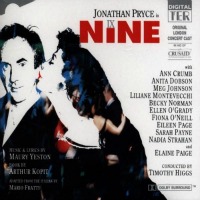 London Concert Cast, 1992 (JAY/TER)
London Concert Cast, 1992 (JAY/TER)  (5 / 5) This recording of Nine benefits from the intelligent, probing, well-sung Guido of Jonathan Pryce. With Elaine Paige as Claudia and Ann Crumb as Luisa, you can expect a certain amount of belting, but that’s in keeping with the expansive, rather grand work of conductor Timothy Higgs. The performance lacks some of the lightness and wit of the Broadway original but, thanks to the singers’ crystalline diction, this is the recording to go with if you really want to savor Yeston’s lyrics. Even the tongue-twisting “Germans at the Spa” is perfectly clear here, as is the notoriously difficult “Grand Canal” sequence that depicts Guido’s disastrous attempts to shoot a film about Casanova. It’s a robust and dramatic account of the score, quite the equal of the original recording. — D.B.
(5 / 5) This recording of Nine benefits from the intelligent, probing, well-sung Guido of Jonathan Pryce. With Elaine Paige as Claudia and Ann Crumb as Luisa, you can expect a certain amount of belting, but that’s in keeping with the expansive, rather grand work of conductor Timothy Higgs. The performance lacks some of the lightness and wit of the Broadway original but, thanks to the singers’ crystalline diction, this is the recording to go with if you really want to savor Yeston’s lyrics. Even the tongue-twisting “Germans at the Spa” is perfectly clear here, as is the notoriously difficult “Grand Canal” sequence that depicts Guido’s disastrous attempts to shoot a film about Casanova. It’s a robust and dramatic account of the score, quite the equal of the original recording. — D.B.
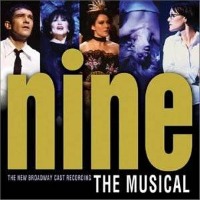 Broadway Cast, 2003 (PS Classics)
Broadway Cast, 2003 (PS Classics)  (4 / 5) Armed with considerable sex appeal and acting skills, along with a pleasing and expressive singing voice, Antonio Banderas had a triumph as Guido in the Broadway revival of Nine. Banderas’s accent is occasionally intrusive, but his boyish, tormented Guido is very effective. Overall, the recording is a little less strong than its predecessors. Mary Stuart Masterson’s Luisa is a tad prosaic, although she delivers a powerful “Be on Your Own.” As Carla, Jane Krakowski sounds sexy but not truly madcap. Chita Rivera is amusing but more than a little spurious as Liliane Lafleur. Laura Benanti is a lovely Claudia, and if her performance lacks the original’s humor, it does have intelligence and skill. Jonathan Tunick’s orchestrations were thinned out for this revival, and the disc omits “The Germans at the Spa” and “Waltz from Nine,” a haunting instrumental that usually follows Guido’s breakdown in “I Can’t Make This Movie.” — D.B.
(4 / 5) Armed with considerable sex appeal and acting skills, along with a pleasing and expressive singing voice, Antonio Banderas had a triumph as Guido in the Broadway revival of Nine. Banderas’s accent is occasionally intrusive, but his boyish, tormented Guido is very effective. Overall, the recording is a little less strong than its predecessors. Mary Stuart Masterson’s Luisa is a tad prosaic, although she delivers a powerful “Be on Your Own.” As Carla, Jane Krakowski sounds sexy but not truly madcap. Chita Rivera is amusing but more than a little spurious as Liliane Lafleur. Laura Benanti is a lovely Claudia, and if her performance lacks the original’s humor, it does have intelligence and skill. Jonathan Tunick’s orchestrations were thinned out for this revival, and the disc omits “The Germans at the Spa” and “Waltz from Nine,” a haunting instrumental that usually follows Guido’s breakdown in “I Can’t Make This Movie.” — D.B.
The Night of the Hunter
 Studio Cast, 1998 (Varèse Sarabande)
Studio Cast, 1998 (Varèse Sarabande)  (2 / 5) Composer Claibe Richardson, best known for his remarkable score for The Grass Harp, worked unsuccessfully on a musical version of Sweeney Todd for several years before Stephen Sondheim produced his masterwork. Richardson then found similarly dark source material in The Night of the Hunter, a 1955 cult film that starred Robert Mitchum as an ex-con “Preacher” with “L-O-V-E” tattooed on the knuckles of one hand and “H-A-T-E” tattooed on the other. This genuinely evil protagonist is a casual murderer who spends most of the story trying to kill two young children for their money. So the question is, “Can you draw sweet water from a foul well?” The score is filled with gorgeous, emotional numbers such as “Lookin’ Ahead,” “The River Jesus,” “One More Harvest,” and especially “Trading Secrets.” Yet some of the material seems shapeless, and Stephen Cole’s lyrics take too long to make the plot points. The real problem here is the Preacher; none of the songs written for this frightening sociopath really land, except for “Trading Secrets,” which has a built-in dramatic situation. The music keeps building in volume and intensity, but it never really gets inside of the character. On the plus side, the cast of this recording is extraordinary, from George Lee Andrews’ quietly desperate performance as the children’s doomed father to Ron Raines as the Preacher and Sally Mayes as one of his victims. Marcia Lewis provides something akin to comic relief, and Dorothy Loudon makes something very special of “One More Harvest.” — David Wolf
(2 / 5) Composer Claibe Richardson, best known for his remarkable score for The Grass Harp, worked unsuccessfully on a musical version of Sweeney Todd for several years before Stephen Sondheim produced his masterwork. Richardson then found similarly dark source material in The Night of the Hunter, a 1955 cult film that starred Robert Mitchum as an ex-con “Preacher” with “L-O-V-E” tattooed on the knuckles of one hand and “H-A-T-E” tattooed on the other. This genuinely evil protagonist is a casual murderer who spends most of the story trying to kill two young children for their money. So the question is, “Can you draw sweet water from a foul well?” The score is filled with gorgeous, emotional numbers such as “Lookin’ Ahead,” “The River Jesus,” “One More Harvest,” and especially “Trading Secrets.” Yet some of the material seems shapeless, and Stephen Cole’s lyrics take too long to make the plot points. The real problem here is the Preacher; none of the songs written for this frightening sociopath really land, except for “Trading Secrets,” which has a built-in dramatic situation. The music keeps building in volume and intensity, but it never really gets inside of the character. On the plus side, the cast of this recording is extraordinary, from George Lee Andrews’ quietly desperate performance as the children’s doomed father to Ron Raines as the Preacher and Sally Mayes as one of his victims. Marcia Lewis provides something akin to comic relief, and Dorothy Loudon makes something very special of “One More Harvest.” — David Wolf
Nick and Nora
 Original Broadway Cast, 1991 (JAY)
Original Broadway Cast, 1991 (JAY)  (2 / 5) As conceived by librettist Arthur Laurents, the ambitious Nick and Nora wanted to be a gripping murder mystery, an X-ray of Hollywood hypocrisies, a feminist investigation of marriage, and also a witty Broadway musical. That this overloaded ship capsized shortly after opening night is no surprise, but what remains is the work of gifted people; and the score, by composer Charles Strouse and lyricist Richard Maltby, Jr., improves with repeated listening. As the title characters, taken from Dashiell Hammett’s novel and movie series The Thin Man, Barry Bostwick and Joanna Gleason probe the murder of a blackmailing bookkeeper, played by Faith Prince in a performance of creepy comic intensity. The list of suspects includes a director of the Erich von Stroheim variety (Remak Ramsay), a Katharine Hepburn-ish actress (Christine Baranski), and a Boston matron based on Rose Kennedy (Debra Monk). There’s also a corrupt union president played by Chris Sarandon. The songs were woven in and out of the dialogue in a way that would have been difficult to reproduce on a recording, so the score isn’t really heard as it was in the show. It’s an odd blend of imitation movie music (“Is There Anything Better than Dancing” and “Let’s Go Home”) with sophisticated-but-sour items like “Men” (the victim’s bitter tirade against the stronger sex), “People Get Hurt” (sung by Monk as the tough matron), and “Busy Night at Lorraine’s” (in which Nick and Nora run through competing versions of the murder). The blue-chip cast cannot be faulted, and Maltby’s lyrics are filled with cleverness and clues. Jonathan Tunick’s orchestrations give Strouse’s music a citrus bite, but the show’s clashing agendas result in serious tonal problems. Frustratingly, the notes in the CD booklet don’t reveal the solution to the mystery, so you’ll have to wait for a (most unlikely) revival to find out who did it and why. — David Barbour
(2 / 5) As conceived by librettist Arthur Laurents, the ambitious Nick and Nora wanted to be a gripping murder mystery, an X-ray of Hollywood hypocrisies, a feminist investigation of marriage, and also a witty Broadway musical. That this overloaded ship capsized shortly after opening night is no surprise, but what remains is the work of gifted people; and the score, by composer Charles Strouse and lyricist Richard Maltby, Jr., improves with repeated listening. As the title characters, taken from Dashiell Hammett’s novel and movie series The Thin Man, Barry Bostwick and Joanna Gleason probe the murder of a blackmailing bookkeeper, played by Faith Prince in a performance of creepy comic intensity. The list of suspects includes a director of the Erich von Stroheim variety (Remak Ramsay), a Katharine Hepburn-ish actress (Christine Baranski), and a Boston matron based on Rose Kennedy (Debra Monk). There’s also a corrupt union president played by Chris Sarandon. The songs were woven in and out of the dialogue in a way that would have been difficult to reproduce on a recording, so the score isn’t really heard as it was in the show. It’s an odd blend of imitation movie music (“Is There Anything Better than Dancing” and “Let’s Go Home”) with sophisticated-but-sour items like “Men” (the victim’s bitter tirade against the stronger sex), “People Get Hurt” (sung by Monk as the tough matron), and “Busy Night at Lorraine’s” (in which Nick and Nora run through competing versions of the murder). The blue-chip cast cannot be faulted, and Maltby’s lyrics are filled with cleverness and clues. Jonathan Tunick’s orchestrations give Strouse’s music a citrus bite, but the show’s clashing agendas result in serious tonal problems. Frustratingly, the notes in the CD booklet don’t reveal the solution to the mystery, so you’ll have to wait for a (most unlikely) revival to find out who did it and why. — David Barbour
The New Moon
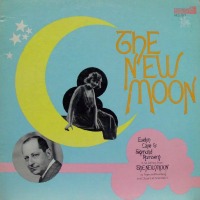 Original London Cast, 1929 (Columbia/Pearl)
Original London Cast, 1929 (Columbia/Pearl)  (4 / 5) With wonderful music by Sigmund Romberg and lyrics by Oscar Hammerstein, this frippery about New Orleans, the French Revolution, and love leveling all classes is one of Romberg’s most melodious works — and the first London cast recording, which has never been long out of print in one form or another, is still one of its best readings. It’s not that the singing here is so impressive; actually, much of it’s quite awful. But the style is so confident, and the choral work and conducting so excellent, that it’s a triumph of operetta spirit over technical considerations. Leading man Howett Worster sings some of “Wanting You” and “Stouthearted Men” an octave down, but he still comes across like an authentic operetta hero. Opposite him, Evelyn Laye is vocally and histrionically his superior, though she does have that late-’20s habit of overemphasizing her vowels. Comic leads Gene Gerrard and Dolores Farris have great fun with “Gorgeous Alexander” and “Try Her Out at Dances”; he’s so callow and charmingly understated, with practically no vocal equipment, that you’d swear he’s Peter Lawford. — Marc Miller
(4 / 5) With wonderful music by Sigmund Romberg and lyrics by Oscar Hammerstein, this frippery about New Orleans, the French Revolution, and love leveling all classes is one of Romberg’s most melodious works — and the first London cast recording, which has never been long out of print in one form or another, is still one of its best readings. It’s not that the singing here is so impressive; actually, much of it’s quite awful. But the style is so confident, and the choral work and conducting so excellent, that it’s a triumph of operetta spirit over technical considerations. Leading man Howett Worster sings some of “Wanting You” and “Stouthearted Men” an octave down, but he still comes across like an authentic operetta hero. Opposite him, Evelyn Laye is vocally and histrionically his superior, though she does have that late-’20s habit of overemphasizing her vowels. Comic leads Gene Gerrard and Dolores Farris have great fun with “Gorgeous Alexander” and “Try Her Out at Dances”; he’s so callow and charmingly understated, with practically no vocal equipment, that you’d swear he’s Peter Lawford. — Marc Miller
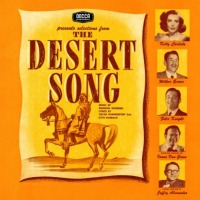 Studio Cast, 1953 (Decca) [user=1] This is a greatest-hits version of the New Moon score, missing several incidental numbers and lacking in theatrical orientation. There’s an overture that’s at least marginally modeled on the original, but those muted trumpets and that augmented string section practically scream “1950s.” The best vocal work comes from Lee Sweetland, who sings “Stouthearted Men” and “Wanting You” like he means it. Leading lady Jane Wilson sounds like she’s out to lunch, while Thomas Hayward is only somewhat more involved in “Softly, as in a Morning Sunrise.” And what are those soft-shoe temple blocks doing in “Marianne”? They and the lobotomized chorus are decades away from authenticity; this New Moon is a little too new. Good digital remastering, though — and it’s packaged on CD with selections from The Desert Song, another Romberg hit. — M.M.
Studio Cast, 1953 (Decca) [user=1] This is a greatest-hits version of the New Moon score, missing several incidental numbers and lacking in theatrical orientation. There’s an overture that’s at least marginally modeled on the original, but those muted trumpets and that augmented string section practically scream “1950s.” The best vocal work comes from Lee Sweetland, who sings “Stouthearted Men” and “Wanting You” like he means it. Leading lady Jane Wilson sounds like she’s out to lunch, while Thomas Hayward is only somewhat more involved in “Softly, as in a Morning Sunrise.” And what are those soft-shoe temple blocks doing in “Marianne”? They and the lobotomized chorus are decades away from authenticity; this New Moon is a little too new. Good digital remastering, though — and it’s packaged on CD with selections from The Desert Song, another Romberg hit. — M.M.
 Studio Cast, 1962 (RCA)
Studio Cast, 1962 (RCA)  (3 / 5) Poor Peter Palmer: born too late for operetta’s golden age, too early to play Jean Valjean. His supple, slightly syrupy tenor is ideal for classic Romberg, and he gets to strut his stuff in this boiled-down version of The New Moon. With Lehman Engel conducting, the tempi are accurate enough, and the cast is fairly well acquainted with the form’s bravado style. Palmer is personable and secure in “Marianne” and “Wanting You,” Arthur Rubin delivers thrilling high notes in “Softly, as in a Morning Sunrise,” but Jeanette Scovotti sounds a bit pinched in the upper register of her songs. The score’s comic numbers are not to be found here. In fact, the editing is pretty schizo; some seldom-recorded snatches of the show are included, such as the intro to “Marianne,” while second choruses and familiar strains are omitted. Henri René’s upholstered arrangements recall the 1960s rather than the heyday of operetta. Here, again, selections from The Desert Song accompany the New Moon songs on CD. — M.M.
(3 / 5) Poor Peter Palmer: born too late for operetta’s golden age, too early to play Jean Valjean. His supple, slightly syrupy tenor is ideal for classic Romberg, and he gets to strut his stuff in this boiled-down version of The New Moon. With Lehman Engel conducting, the tempi are accurate enough, and the cast is fairly well acquainted with the form’s bravado style. Palmer is personable and secure in “Marianne” and “Wanting You,” Arthur Rubin delivers thrilling high notes in “Softly, as in a Morning Sunrise,” but Jeanette Scovotti sounds a bit pinched in the upper register of her songs. The score’s comic numbers are not to be found here. In fact, the editing is pretty schizo; some seldom-recorded snatches of the show are included, such as the intro to “Marianne,” while second choruses and familiar strains are omitted. Henri René’s upholstered arrangements recall the 1960s rather than the heyday of operetta. Here, again, selections from The Desert Song accompany the New Moon songs on CD. — M.M.
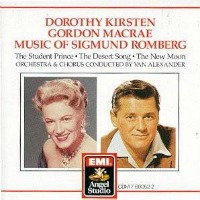 Studio Cast, 1963 (Capitol/EMI)
Studio Cast, 1963 (Capitol/EMI)  (2 / 5) Sigmund Romberg surely did not intend “Softly, as in a Morning Sunrise” for a marimba-band arrangement, but that’s what it gets in this arthritic reading of his classic New Moon score. (Only a few songs from the original recording are included on the EMI CD, along with numbers from other Romberg shows.) The indignities don’t end there: Van Alexander stiffly conducts some of his own godawful orchestrations and others by Warren Barker. But Gordon MacRae is in fine voice, and Dorothy Kirsten’s timbre is well suited to the likes of “The Girl on the Prow” and “Lover, Come Back to Me.” The Roger Wagner Chorale backs them up, sounding bored. The polka “Try Her Out at Dances,” usually expurgated, is included; but with Alexander practically dozing off as he conducts an uninvolved band of choristers in Muzak-like arrangements, this is the Geritol version of the score. On EMI’s CD, it’s packaged with selections from The Student Prince and The Desert Song, also performed by MacRae and Kirsten. — M.M.
(2 / 5) Sigmund Romberg surely did not intend “Softly, as in a Morning Sunrise” for a marimba-band arrangement, but that’s what it gets in this arthritic reading of his classic New Moon score. (Only a few songs from the original recording are included on the EMI CD, along with numbers from other Romberg shows.) The indignities don’t end there: Van Alexander stiffly conducts some of his own godawful orchestrations and others by Warren Barker. But Gordon MacRae is in fine voice, and Dorothy Kirsten’s timbre is well suited to the likes of “The Girl on the Prow” and “Lover, Come Back to Me.” The Roger Wagner Chorale backs them up, sounding bored. The polka “Try Her Out at Dances,” usually expurgated, is included; but with Alexander practically dozing off as he conducts an uninvolved band of choristers in Muzak-like arrangements, this is the Geritol version of the score. On EMI’s CD, it’s packaged with selections from The Student Prince and The Desert Song, also performed by MacRae and Kirsten. — M.M.
 Encores! Cast, 2004 (Ghostlight)
Encores! Cast, 2004 (Ghostlight)  (5 / 5) To date, The New Moon is the only operetta presented by the New York City Center Encores! series, in a 2003 production that was surprisingly limber and popular. Ghostlight released a well-produced cast album a year later. Rob Fisher expertly conducts a lush 36-piece orchestra, some never-before-recorded fragments turn up in a gratifyingly complete reading, and the casting is top-notch from top to bottom. Rodney Gilfry’s hero is neatly poised between sincerity and winking irony — he’s tongue in cheek, but he never camps — and his operatic baritone makes as good a case for “Stout-Hearted Men” and “Wanting You” as will ever be made. Christiane Noll is a winsome leading lady with spirited attitude and secure high Cs, and Brandon Jovanovich’s “Softly, As in a Morning Sunrise” is absolutely thrilling. A special shout-out to comic second couple Peter Benson and Lauren Ward, who are vocally secure and shot through with the proper vaudeville DNA. A large chorus nails the harmonies, and even F. Murray Abraham generously taxied to the studio to set down a couple of lines of less-than-deathless dialogue. If this recording doesn’t sell you on the charms of operetta, nothing will. — M.M.
(5 / 5) To date, The New Moon is the only operetta presented by the New York City Center Encores! series, in a 2003 production that was surprisingly limber and popular. Ghostlight released a well-produced cast album a year later. Rob Fisher expertly conducts a lush 36-piece orchestra, some never-before-recorded fragments turn up in a gratifyingly complete reading, and the casting is top-notch from top to bottom. Rodney Gilfry’s hero is neatly poised between sincerity and winking irony — he’s tongue in cheek, but he never camps — and his operatic baritone makes as good a case for “Stout-Hearted Men” and “Wanting You” as will ever be made. Christiane Noll is a winsome leading lady with spirited attitude and secure high Cs, and Brandon Jovanovich’s “Softly, As in a Morning Sunrise” is absolutely thrilling. A special shout-out to comic second couple Peter Benson and Lauren Ward, who are vocally secure and shot through with the proper vaudeville DNA. A large chorus nails the harmonies, and even F. Murray Abraham generously taxied to the studio to set down a couple of lines of less-than-deathless dialogue. If this recording doesn’t sell you on the charms of operetta, nothing will. — M.M.
New Girl in Town
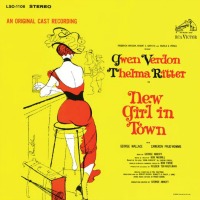 Original Broadway Cast, 1957 (RCA)
Original Broadway Cast, 1957 (RCA)  (4 / 5) Although rarely revived today, New Girl in Town ran for a respectable 431 performances on Broadway, and this adaptation of Eugene O’Neill’s Anna Christie sounds like a hit on the cast album. The score, by composer-lyricist Bob Merrill, is bouncy and colorful. Highlights include the naughty “On the Farm,” the catchy “The Sunshine Girl,” and the beautiful “Look at ‘Er” and “Did You Close Your Eyes?” The terrific performances of Gwen Verdon and Thelma Ritter in this show earned them a rare tie for Tony Awards as Best Actress in a Musical. George Wallace is fine in the big baritone role of Mat, Cameron Prud’homme is effective as Chris, and Lulu Bates and Mara Landi stand out in “Flings.” — Gerard Alessandrini
(4 / 5) Although rarely revived today, New Girl in Town ran for a respectable 431 performances on Broadway, and this adaptation of Eugene O’Neill’s Anna Christie sounds like a hit on the cast album. The score, by composer-lyricist Bob Merrill, is bouncy and colorful. Highlights include the naughty “On the Farm,” the catchy “The Sunshine Girl,” and the beautiful “Look at ‘Er” and “Did You Close Your Eyes?” The terrific performances of Gwen Verdon and Thelma Ritter in this show earned them a rare tie for Tony Awards as Best Actress in a Musical. George Wallace is fine in the big baritone role of Mat, Cameron Prud’homme is effective as Chris, and Lulu Bates and Mara Landi stand out in “Flings.” — Gerard Alessandrini
New Faces of 1968
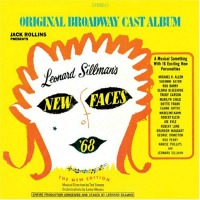 Original Broadway Cast, 1968 (Warner Bros./DRG)
Original Broadway Cast, 1968 (Warner Bros./DRG)  (2 / 5) If you want to know what killed the traditional Broadway revue, this cast album provides two answers: economics and a bankruptcy of imagination. New Faces series impresario Leonard Sillman himself is on hand here to introduce the talent. And there is talent: Madeline Kahn, Robert Klein, the forgotten Marilyn Child. But even though much of the material is by series veterans Ronny Graham, June Carroll, Arthur Siegel, and Murray Grand, it sounds like stuff you’d hear on the Straw Hat Circuit. A mistress of ceremonies, Gloria Bleezarde, reads her intros weakly, and what she’s introducing seldom soars. The running gag of Brandon Maggart (he of the big, silly voice) singing terrible special material by composer-lyricist Clark Gesner collapses right out of the gate, but plods on and on. Sociological historians might enjoy the pseudo-hipness of it all; the glimmerings of Women’s Lib can be detected in Child’s rendition of “Where Is Me?”, and M. K. Allen’s bad-black-dude turn in “Evil” sounds like a warm-up for Super Fly. Most of the rest sinks, but there is one moment of glory: Kahn’s peerless Lotte Lenya sendup, “Das Chicago Song.” Now, here was a New Face worth discovering! — Marc Miller
(2 / 5) If you want to know what killed the traditional Broadway revue, this cast album provides two answers: economics and a bankruptcy of imagination. New Faces series impresario Leonard Sillman himself is on hand here to introduce the talent. And there is talent: Madeline Kahn, Robert Klein, the forgotten Marilyn Child. But even though much of the material is by series veterans Ronny Graham, June Carroll, Arthur Siegel, and Murray Grand, it sounds like stuff you’d hear on the Straw Hat Circuit. A mistress of ceremonies, Gloria Bleezarde, reads her intros weakly, and what she’s introducing seldom soars. The running gag of Brandon Maggart (he of the big, silly voice) singing terrible special material by composer-lyricist Clark Gesner collapses right out of the gate, but plods on and on. Sociological historians might enjoy the pseudo-hipness of it all; the glimmerings of Women’s Lib can be detected in Child’s rendition of “Where Is Me?”, and M. K. Allen’s bad-black-dude turn in “Evil” sounds like a warm-up for Super Fly. Most of the rest sinks, but there is one moment of glory: Kahn’s peerless Lotte Lenya sendup, “Das Chicago Song.” Now, here was a New Face worth discovering! — Marc Miller
New Faces of 1956
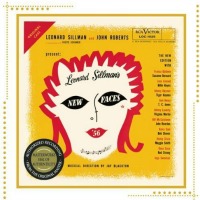 Original Broadway Cast, 1956 (RCA/Arkiv)
Original Broadway Cast, 1956 (RCA/Arkiv)  (4 / 5) While it didn’t create as big a sensation as New Faces of 1952, this revue boasted another impressive roster of performers. Front and center is T.E. Jones, a gifted mimic, comedian, and female impersonator, who opens the album as a boozy, befuddled Tallulah Bankhead. A grab bag of material written by various songwriters is performed by such talents as big-voiced belter Amru Sani, the slyly hep Tiger Haynes, baritone John Reardon, ingenue Inga Swenson, and the comediennes Billie Hayes and Jane Connell. (The latter’s performance of “April in Fairbanks” recalls the beloved “Boston Beguine” of the 1952 edition.) A young Maggie Smith is uproariously funny in “One Perfect Moment,” a love ditty in which her voice becomes more piercing as her rapture escalates. “Isn’t She Lovely?” is best of all, a devastating parody of a Bankhead-headlined edition of the Ziegfeld Follies that had been a recent flop. The wordplay here is hilarious, and so is Reardon’s turn as a dreadful, off-key revue tenor. Note: This cast album is also available on a Stage Door CD that includes Eartha Kitt in Mrs. Patterson, a curiosity from 1954.– Richard Barrios
(4 / 5) While it didn’t create as big a sensation as New Faces of 1952, this revue boasted another impressive roster of performers. Front and center is T.E. Jones, a gifted mimic, comedian, and female impersonator, who opens the album as a boozy, befuddled Tallulah Bankhead. A grab bag of material written by various songwriters is performed by such talents as big-voiced belter Amru Sani, the slyly hep Tiger Haynes, baritone John Reardon, ingenue Inga Swenson, and the comediennes Billie Hayes and Jane Connell. (The latter’s performance of “April in Fairbanks” recalls the beloved “Boston Beguine” of the 1952 edition.) A young Maggie Smith is uproariously funny in “One Perfect Moment,” a love ditty in which her voice becomes more piercing as her rapture escalates. “Isn’t She Lovely?” is best of all, a devastating parody of a Bankhead-headlined edition of the Ziegfeld Follies that had been a recent flop. The wordplay here is hilarious, and so is Reardon’s turn as a dreadful, off-key revue tenor. Note: This cast album is also available on a Stage Door CD that includes Eartha Kitt in Mrs. Patterson, a curiosity from 1954.– Richard Barrios
New Faces of 1952
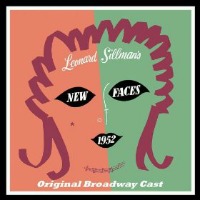 Original Broadway Cast, 1952 (RCA/Jasmine)
Original Broadway Cast, 1952 (RCA/Jasmine)  (2 / 5) Broadway once thrived on clever little revues in which clever young people satirized whatever was topical along the Great White Way and in the news. Once considered the height of sophistication, they might as well be written in Sumerian for all that they have to offer modern audiences — with, of course, a few songs and skits as timeless exceptions. New Faces of 1952, created by a legion of writers including Sheldon Harnick, is considered a classic of the genre, perhaps because it launched so many careers. Alice Ghostley sings “The Boston Beguine,” a moody Latin ballad about the city of beans and Brahmins, and a pre-Hogan’s Heroes Robert Clary romps as a romantic Frenchman in “Lucky Pierre.” A minor presence on the cast album is Paul Lynde, who had very little musical material in the show. It’s all very cute and negligible. Among the most enjoyable items, Virginia de Luce performs “He Takes Me Off His Income Tax,” while Eartha Kitt sizzles her way through the faux-French “Bal Petit Bal” and vamps as a world-weary playgirl in “Monotonous.” — David Barbour
(2 / 5) Broadway once thrived on clever little revues in which clever young people satirized whatever was topical along the Great White Way and in the news. Once considered the height of sophistication, they might as well be written in Sumerian for all that they have to offer modern audiences — with, of course, a few songs and skits as timeless exceptions. New Faces of 1952, created by a legion of writers including Sheldon Harnick, is considered a classic of the genre, perhaps because it launched so many careers. Alice Ghostley sings “The Boston Beguine,” a moody Latin ballad about the city of beans and Brahmins, and a pre-Hogan’s Heroes Robert Clary romps as a romantic Frenchman in “Lucky Pierre.” A minor presence on the cast album is Paul Lynde, who had very little musical material in the show. It’s all very cute and negligible. Among the most enjoyable items, Virginia de Luce performs “He Takes Me Off His Income Tax,” while Eartha Kitt sizzles her way through the faux-French “Bal Petit Bal” and vamps as a world-weary playgirl in “Monotonous.” — David Barbour
A New Brain
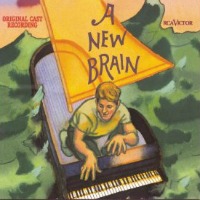 Original Off-Broadway Cast, 1998 (RCA)
Original Off-Broadway Cast, 1998 (RCA)  (4 / 5) Those who find much of William Finn’s work too abrasive should check out this moving and original musical about serious illness. In collaboration with librettist James Lapine, composer-lyricist Finn brings comedy and feeling to this most unlikely subject. Malcolm Gets stars as Gordon, a frustrated songwriter; when he’s diagnosed with an arteriovenous malformation (AVM) in his brain, his family and friends rally around. The score mixes Finn’s neurotic, hilarious brand of kvetching with some ballads that reflect a new-found serenity in his work. Among the comic highlights are “And They’re Off,” which recounts Gordon’s troubled family history; “Poor, Unsuccessful, and Fat,” the lament of a nurse (Michael Mandell); and “The Homeless Lady’s Revenge,” sung by a resourceful derelict (Mary Testa). The album’s real gems also include “The Music Still Plays On,” a torch song delivered by Gordon’s mother (Penny Fuller); and the final ballad, “I Feel So Much Spring,” in which many aspects of Gordon’s life come into harmony. There’s also good work from Chip Zien as a malevolent TV host, and amusing contributions by Kristin Chenoweth pre-stardom. In the role of Gordon’s lover, Norm Lewis fills in for original cast member Christopher Innvar (who left the show due to vocal problems) and offers a dreamy performance of the love song “Sailing.” — David Barbour
(4 / 5) Those who find much of William Finn’s work too abrasive should check out this moving and original musical about serious illness. In collaboration with librettist James Lapine, composer-lyricist Finn brings comedy and feeling to this most unlikely subject. Malcolm Gets stars as Gordon, a frustrated songwriter; when he’s diagnosed with an arteriovenous malformation (AVM) in his brain, his family and friends rally around. The score mixes Finn’s neurotic, hilarious brand of kvetching with some ballads that reflect a new-found serenity in his work. Among the comic highlights are “And They’re Off,” which recounts Gordon’s troubled family history; “Poor, Unsuccessful, and Fat,” the lament of a nurse (Michael Mandell); and “The Homeless Lady’s Revenge,” sung by a resourceful derelict (Mary Testa). The album’s real gems also include “The Music Still Plays On,” a torch song delivered by Gordon’s mother (Penny Fuller); and the final ballad, “I Feel So Much Spring,” in which many aspects of Gordon’s life come into harmony. There’s also good work from Chip Zien as a malevolent TV host, and amusing contributions by Kristin Chenoweth pre-stardom. In the role of Gordon’s lover, Norm Lewis fills in for original cast member Christopher Innvar (who left the show due to vocal problems) and offers a dreamy performance of the love song “Sailing.” — David Barbour
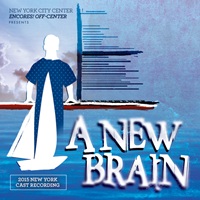 New York City Center Encores! Cast, 2015 (PS Classics, 2CDs)
New York City Center Encores! Cast, 2015 (PS Classics, 2CDs)  (2.5 / 5) As the central character of A New Brain sings at one point, “You’ve got to have heart and music,” words that were not always remembered in the making of this recording — a skilled yet strangely impersonal performance that scants both the material’s wisecracking veneer and a sorrowful undertone rooted in divorce, dysfunction, and the specter of early death. This is a slightly revised version of the score; the new stuff is mostly filler, updating us on Gordon’s medical status. (You won’t be hearing “Craniotomy” in a piano bar anytime soon.) Jonathan Groff sings with his usual proficiency, yet with a surprising placidity that doesn’t suit the character. Ana Gasteyer does a solid enough job with “The Music Still Plays On,” but Penny Fuller’s guts and passion are much missed in this song. Rema Webb sounds a bit like Mary Testa, though without the latter’s edgy humor. Christian Borle (subbing for Dan Fogler, who appeared in the Encores! production) is a poor substitute for Chip Zien and his amusingly tyrannical delivery. The best work here comes from Josh Lamon, charmingly world-weary in the relatively minor role of the nurse. Adding a touching note, Roger (Gordon’s lover) is sung by Aaron Lazar, who recently went public about his struggle with ALS, thereby calling to mind Gordon’s situation. Note: In an especially odd bit, this show now features a joke about Fun Home, which was also recorded by PS Classics. Product placement? — D.B.
(2.5 / 5) As the central character of A New Brain sings at one point, “You’ve got to have heart and music,” words that were not always remembered in the making of this recording — a skilled yet strangely impersonal performance that scants both the material’s wisecracking veneer and a sorrowful undertone rooted in divorce, dysfunction, and the specter of early death. This is a slightly revised version of the score; the new stuff is mostly filler, updating us on Gordon’s medical status. (You won’t be hearing “Craniotomy” in a piano bar anytime soon.) Jonathan Groff sings with his usual proficiency, yet with a surprising placidity that doesn’t suit the character. Ana Gasteyer does a solid enough job with “The Music Still Plays On,” but Penny Fuller’s guts and passion are much missed in this song. Rema Webb sounds a bit like Mary Testa, though without the latter’s edgy humor. Christian Borle (subbing for Dan Fogler, who appeared in the Encores! production) is a poor substitute for Chip Zien and his amusingly tyrannical delivery. The best work here comes from Josh Lamon, charmingly world-weary in the relatively minor role of the nurse. Adding a touching note, Roger (Gordon’s lover) is sung by Aaron Lazar, who recently went public about his struggle with ALS, thereby calling to mind Gordon’s situation. Note: In an especially odd bit, this show now features a joke about Fun Home, which was also recorded by PS Classics. Product placement? — D.B.
The Nervous Set
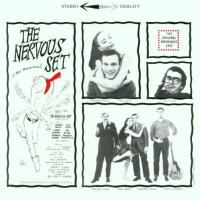 Original Broadway Cast, 1959 (ColumbialDRG)
Original Broadway Cast, 1959 (ColumbialDRG)  (2 / 5) This investigation of beatnik culture ran for only 23 performances, and you’ll know why when you hear the cast album. With a jazz quartet instead of an orchestra for instrumental accompaniment, and with song titles like “Man, We’re Beat,” The Nervous Set comes across more like a faded topical revue than a book musical about love among Greenwich Villagers. The libretto is by Jay Landesman and Theodore J. Flicker. The score, by Tommy Wolf and Fran Landesman, did yield a couple of attractive numbers in “The Ballad of the Sad Young Men” and “Fun Life” (“Shakespeare was a hack / So we read Kerouac!”). There’s also a charming counterpoint duet, “What’s to Lose/Stars Have Blown My Way,” and the introspective “Laugh, I Thought I’d Die.” But the comedy numbers are painful, especially the kinky “How Do You Like Your Love?” and the repetitive “Party Song.” The cast isn’t loaded with distinctive voices, although ingenue Tani Seitz’s singing has a sweet, sad quality. A very young Larry Hagman gets a country-western hoedown, “Travel the Road of Love,” but the song is only one curio in an album filled with them. — David Barbour
(2 / 5) This investigation of beatnik culture ran for only 23 performances, and you’ll know why when you hear the cast album. With a jazz quartet instead of an orchestra for instrumental accompaniment, and with song titles like “Man, We’re Beat,” The Nervous Set comes across more like a faded topical revue than a book musical about love among Greenwich Villagers. The libretto is by Jay Landesman and Theodore J. Flicker. The score, by Tommy Wolf and Fran Landesman, did yield a couple of attractive numbers in “The Ballad of the Sad Young Men” and “Fun Life” (“Shakespeare was a hack / So we read Kerouac!”). There’s also a charming counterpoint duet, “What’s to Lose/Stars Have Blown My Way,” and the introspective “Laugh, I Thought I’d Die.” But the comedy numbers are painful, especially the kinky “How Do You Like Your Love?” and the repetitive “Party Song.” The cast isn’t loaded with distinctive voices, although ingenue Tani Seitz’s singing has a sweet, sad quality. A very young Larry Hagman gets a country-western hoedown, “Travel the Road of Love,” but the song is only one curio in an album filled with them. — David Barbour
Naked Boys Singing!
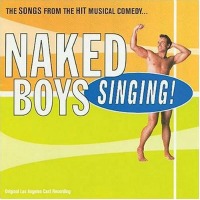 Original Los Angeles Cast, 1998 (Cafe Pacific)
Original Los Angeles Cast, 1998 (Cafe Pacific)  (3 / 5) Obviously, the cast album can’t capture the raison d’être of this popular revue. Yet it does help make conceiver-director Robert Schrock’s case, as described in his notes for the recording, that Naked Boys Singing! is not a salacious show but, rather, a simple celebration of nudity. When you hear these charming songs (by various writers) about nakedness in settings ranging from a bris to a locker room, you’ll understand why many people who have seen the show feel it’s more cute than crude. Still, with sometimes explicit mentions of male privates — most hilariously in “Members Only” and “Perky Little Porn Star” — even the recording is for mature audiences only. Other comic highlights include “The Naked Maid,” “Nothin’ but the Radio On,” and a tribute to one-time movie sex symbol Robert Mitchum. Naked Boys also has its more serious moments, notably the lovely ballad “Window to Window,” about two men looking at each other from separate apartments and contemplating meeting. — Brooke Pierce
(3 / 5) Obviously, the cast album can’t capture the raison d’être of this popular revue. Yet it does help make conceiver-director Robert Schrock’s case, as described in his notes for the recording, that Naked Boys Singing! is not a salacious show but, rather, a simple celebration of nudity. When you hear these charming songs (by various writers) about nakedness in settings ranging from a bris to a locker room, you’ll understand why many people who have seen the show feel it’s more cute than crude. Still, with sometimes explicit mentions of male privates — most hilariously in “Members Only” and “Perky Little Porn Star” — even the recording is for mature audiences only. Other comic highlights include “The Naked Maid,” “Nothin’ but the Radio On,” and a tribute to one-time movie sex symbol Robert Mitchum. Naked Boys also has its more serious moments, notably the lovely ballad “Window to Window,” about two men looking at each other from separate apartments and contemplating meeting. — Brooke Pierce
Myths and Hymn (Saturn Returns)
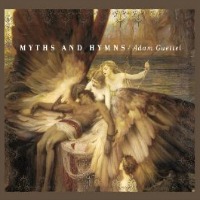 Studio Cast, 1999 (Nonesuch)
Studio Cast, 1999 (Nonesuch)  (4 / 5) Composer-lyricist Adam Guettel’s song cycle Saturn Returns had a brief run at The Public Theater but never got an original cast album. Myths and Hymns comes pretty close, as this recording contains most of the show’s songs (which include additional lyrics by Ellen Fitzhugh) and features the original cast joined by three more wonderful performers: Billy Porter, Audra McDonald, and the dulcet-toned composer himself. The album delivers what the title promises, offering Guettel’s unique perspectives on Greek myths, musical settings of obscure hymnal lyrics, and original hymns. Most of the mythic songs are humorous, modern psychological deconstructions of such legends as the one about Icarus, while the hymns capture both the optimism and anguish of spiritual belief; listen to Porter’s fiery “Awaiting You” for the best example of the latter. One of the most striking pieces concerns an abortion. The style of composition varies greatly, from the funky electronics of “Icarus” to the joyful gospel sound of “There’s a Shout,” the angular “Children of the Heavenly King,” and the soaring “Migratory V.” “Hero and Leander” is a ravishing romantic ballad, and even more compelling is “Saturn Returns,” a musical monologue in which the composer laments: “I don’t know what I hunger for, I only know I feel the hunger more and more with every passing day.” — Brooke Pierce
(4 / 5) Composer-lyricist Adam Guettel’s song cycle Saturn Returns had a brief run at The Public Theater but never got an original cast album. Myths and Hymns comes pretty close, as this recording contains most of the show’s songs (which include additional lyrics by Ellen Fitzhugh) and features the original cast joined by three more wonderful performers: Billy Porter, Audra McDonald, and the dulcet-toned composer himself. The album delivers what the title promises, offering Guettel’s unique perspectives on Greek myths, musical settings of obscure hymnal lyrics, and original hymns. Most of the mythic songs are humorous, modern psychological deconstructions of such legends as the one about Icarus, while the hymns capture both the optimism and anguish of spiritual belief; listen to Porter’s fiery “Awaiting You” for the best example of the latter. One of the most striking pieces concerns an abortion. The style of composition varies greatly, from the funky electronics of “Icarus” to the joyful gospel sound of “There’s a Shout,” the angular “Children of the Heavenly King,” and the soaring “Migratory V.” “Hero and Leander” is a ravishing romantic ballad, and even more compelling is “Saturn Returns,” a musical monologue in which the composer laments: “I don’t know what I hunger for, I only know I feel the hunger more and more with every passing day.” — Brooke Pierce
The Mystery of Edwin Drood
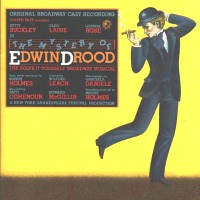 Original Cast, 1986 (Polydor/Varèse Sarabande/Verve)
Original Cast, 1986 (Polydor/Varèse Sarabande/Verve)  (3 / 5) Composer-lyricist-Iibrettist Rupert Holmes folded a tribute to the English music hall into his adaptation of Charles Dickens’ unfinished novel The Mystery of Edwin Drood, and he came up with an intriguing musical whodunit. The original cast, as preserved here, is exemplary; it includes the great George Rose and the one-of-a-kind Cleo Laine, along with heavy-hitting Broadway pros Howard McGillin, Patti Cohenour, Judy Kuhn, Donna Murphy, and belter extraordinaire Betty Buckley in the title role. “The Wages of Sin” is a specialty number delivered stylishly by Laine, and the haunting “Moonfall” is beautifully rendered by Cohenour. Other standouts are the boisterous opening number, “There You Are”; the breathless “Both Sides of the Coin”; the exciting “Don’t Quit While You’re Ahead”; and the finale, “The Writing on the Wall.” This show’s peculiar distinction is that it allowed audiences to vote on how the plot should conclude. The two separate CD editions of the cast recording offer varying material in regard to those choices, and the Varèse reinstates “Ceylon” and the “Moonfall” quartet, which are not on the Polydor disc. But all of the tracks are available in mp3 format. — Matthew Murray
(3 / 5) Composer-lyricist-Iibrettist Rupert Holmes folded a tribute to the English music hall into his adaptation of Charles Dickens’ unfinished novel The Mystery of Edwin Drood, and he came up with an intriguing musical whodunit. The original cast, as preserved here, is exemplary; it includes the great George Rose and the one-of-a-kind Cleo Laine, along with heavy-hitting Broadway pros Howard McGillin, Patti Cohenour, Judy Kuhn, Donna Murphy, and belter extraordinaire Betty Buckley in the title role. “The Wages of Sin” is a specialty number delivered stylishly by Laine, and the haunting “Moonfall” is beautifully rendered by Cohenour. Other standouts are the boisterous opening number, “There You Are”; the breathless “Both Sides of the Coin”; the exciting “Don’t Quit While You’re Ahead”; and the finale, “The Writing on the Wall.” This show’s peculiar distinction is that it allowed audiences to vote on how the plot should conclude. The two separate CD editions of the cast recording offer varying material in regard to those choices, and the Varèse reinstates “Ceylon” and the “Moonfall” quartet, which are not on the Polydor disc. But all of the tracks are available in mp3 format. — Matthew Murray
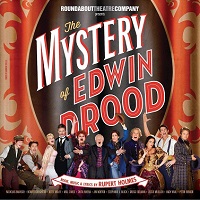 Broadway Cast, 2013 (DRG)
Broadway Cast, 2013 (DRG)  (5 / 5) This is one of the most exuberant cast albums out there. From the exhilarating opening address to the audience, “There You Are,” through to the final high-vaulted chords of “The Writing On the Wall,” there’s a palpable sense that the whole cast — and even the orchestra — are having endless fun scampering over the dexterously, densely written landscape of Rupert Holmes’ score. With The Mystery of Edwin Drood, Holmes proved himself a quadruple threat, having written the show’s music, book, lyrics, and orchestrations. Part of the infectious energy of this Broadway revival cast album comes from the way the cast leans into the show-within-a-show framework; they’re all portraying English music hall actors putting on a production of Drood, so everyone heightens but only slightly hams up their performances. And what performances they are: Will Chase as a terrifying John Jasper, chomping at the bit with lunacy and lust; Betsy Wolfe, adding an edge to the silver-voiced Rosa Bud; Jessie Mueller, stealing the show with delicious venom as Helena; the extraordinary Stephanie J. Block, whose belt has never been put to better use, leading the company in the title role. And even though Broadway icon Chita Rivera is given the score’s least compelling pair of songs, she shines with affectionate raunchiness as the madam, Princess Puffer. This Drood is at its best when the cast members team up for duets such as “Perfect Strangers” and “The Name of Love”/“Moonlight Reprise,” or ensemble moments in “No Good Can Come From Mad” and the stunning “Moonlight Quartet.” Departing from the 1986 recording, the revival album includes the rich instrumental “Opium Den Ballet” plus a new second act opener, “An English Music Hall,” and a freshly-conceived version of “Ceylon”/“A British Subject” that erupts into Holmes’ distinctively opulent counterpoint. (The music hall context lets Mueller and Andy Karl get away with caricatured accents that would otherwise come across as offensive). As for the show’s alternative endings, this album smartly reduces the Detective Datchery reveals to two tracks, keeps in all eight murderers’ confessions, and adds a clever album-only mashup of the possible pairs of lovers. A final note of praise is that the recording is gorgeously mixed; you can understand every word of Holmes’ tangly text, and individual instruments (especially in the reed section) feel like characters themselves. — Dan Rubins
(5 / 5) This is one of the most exuberant cast albums out there. From the exhilarating opening address to the audience, “There You Are,” through to the final high-vaulted chords of “The Writing On the Wall,” there’s a palpable sense that the whole cast — and even the orchestra — are having endless fun scampering over the dexterously, densely written landscape of Rupert Holmes’ score. With The Mystery of Edwin Drood, Holmes proved himself a quadruple threat, having written the show’s music, book, lyrics, and orchestrations. Part of the infectious energy of this Broadway revival cast album comes from the way the cast leans into the show-within-a-show framework; they’re all portraying English music hall actors putting on a production of Drood, so everyone heightens but only slightly hams up their performances. And what performances they are: Will Chase as a terrifying John Jasper, chomping at the bit with lunacy and lust; Betsy Wolfe, adding an edge to the silver-voiced Rosa Bud; Jessie Mueller, stealing the show with delicious venom as Helena; the extraordinary Stephanie J. Block, whose belt has never been put to better use, leading the company in the title role. And even though Broadway icon Chita Rivera is given the score’s least compelling pair of songs, she shines with affectionate raunchiness as the madam, Princess Puffer. This Drood is at its best when the cast members team up for duets such as “Perfect Strangers” and “The Name of Love”/“Moonlight Reprise,” or ensemble moments in “No Good Can Come From Mad” and the stunning “Moonlight Quartet.” Departing from the 1986 recording, the revival album includes the rich instrumental “Opium Den Ballet” plus a new second act opener, “An English Music Hall,” and a freshly-conceived version of “Ceylon”/“A British Subject” that erupts into Holmes’ distinctively opulent counterpoint. (The music hall context lets Mueller and Andy Karl get away with caricatured accents that would otherwise come across as offensive). As for the show’s alternative endings, this album smartly reduces the Detective Datchery reveals to two tracks, keeps in all eight murderers’ confessions, and adds a clever album-only mashup of the possible pairs of lovers. A final note of praise is that the recording is gorgeously mixed; you can understand every word of Holmes’ tangly text, and individual instruments (especially in the reed section) feel like characters themselves. — Dan Rubins
My One and Only
 Original Broadway Cast, 1983 (Atlantic)
Original Broadway Cast, 1983 (Atlantic)  (3 / 5) This “new” musical was written around old George and Ira Gershwin songs. During its troubled pre-Broadway tryout, book writer Peter Stone and the uncredited Mike Nichols oversaw an extensive reworking of the show, with star Tommy Tune taking over as director. They surprised everybody by pulling it off; by the time My One and Only reached New York, it was delightful. The cast album is not a fully accurate representation of the production, which was much more fluid than this recording suggests, with witty dance numbers popping up from the ensemble as well as the stars. (This is the show in which Twiggy and Tommy Tune tap-danced in water during “S Wonderful.”) Several songs have been left off the album, including the chorus number “Just Another Rhumba.” A more serious omission is dancer Honi Coles’ big first-act showcase, “High Hat” — a skillful weave of dialogue, singing, and dance that was inexplicably replaced on the recording by a straightforward version of “Sweet and Lowdown.” On the other hand, Twiggy and Tune are heard duetting in “Little Jazz Bird,” even though that number was cut from the show. Throughout, the stars are charming, and the music and lyrics incomparable. A partial list of highlights: “I Can’t Be Bothered Now,” “Boy Wanted,” “Soon,” “He Loves and She Loves,” “How Long Has This Been Going On?” and, of course, the fabulous title song. — David Wolf
(3 / 5) This “new” musical was written around old George and Ira Gershwin songs. During its troubled pre-Broadway tryout, book writer Peter Stone and the uncredited Mike Nichols oversaw an extensive reworking of the show, with star Tommy Tune taking over as director. They surprised everybody by pulling it off; by the time My One and Only reached New York, it was delightful. The cast album is not a fully accurate representation of the production, which was much more fluid than this recording suggests, with witty dance numbers popping up from the ensemble as well as the stars. (This is the show in which Twiggy and Tommy Tune tap-danced in water during “S Wonderful.”) Several songs have been left off the album, including the chorus number “Just Another Rhumba.” A more serious omission is dancer Honi Coles’ big first-act showcase, “High Hat” — a skillful weave of dialogue, singing, and dance that was inexplicably replaced on the recording by a straightforward version of “Sweet and Lowdown.” On the other hand, Twiggy and Tune are heard duetting in “Little Jazz Bird,” even though that number was cut from the show. Throughout, the stars are charming, and the music and lyrics incomparable. A partial list of highlights: “I Can’t Be Bothered Now,” “Boy Wanted,” “Soon,” “He Loves and She Loves,” “How Long Has This Been Going On?” and, of course, the fabulous title song. — David Wolf

